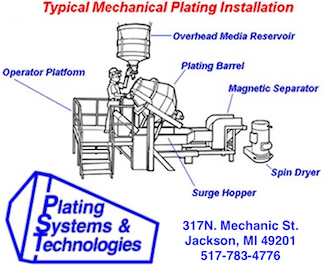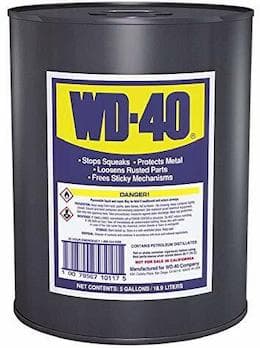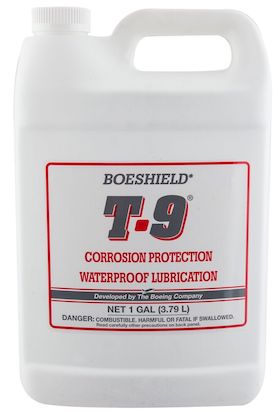
-----
Treating bare metal to prevent rusting
Q. I am a A/P mechanic with a lot of Snap-On tools. Some of these tools have had engravings on them and then removed. I understand that I cannot chrome plate these at home, but is there an acid etch that I can apply to area's where the chrome plating has been removed to prevent them from rusting?
Kevin Smith- Winston Salem, North Carolina, U.S.A.
2002
A. Please do not apply acid to your tools - it will ruin them! An acid etch will CAUSE rusting to the exposed steel. Probably the best way to keep your tools from rusting is to keep a thin layer of oil ( WD-40
⇦ on
eBay
or
Amazon [affil link]
works fine).
on them when they are not in use - this will act as a moisture barrier and inhibit corrosion. Maybe a local plating shop can strip, polish, and replate the tools, although I think that would probably void Snap-On's lifetime warranty. I think I'd go with the oil.
chemical process supplier - Gurnee, Illinois
2002
A. Effective, and simple remedies for removing rust from rusted tools are available; these do not eat away the metal; they just remove rust and leave a relatively passivated surface. At the end of the process, it is not necessary to rinse the surface with water. Just wipe the treated area with clean, white, starch-free cloth.
S. M. SubramaniamChennai, Tamil NADU, India
2002
A. Spray on/wipe off with Boeshield T-9 ⇨
The stuff is an extraordinary penetrant that reminds you of WD-40, but the atmospheric seal and "wet-look" stays for months.
The product was originally developed by Boeing to a military specification for inhibiting corrosion and oxidation on both aluminum and ferrous alloys, including electrical/electronic apparatus (nonconductive). I understand some Yamaha bike shops are carrying it.
No, I have nothing to do with the outfit. I'm a retired ME who rebuilds old Harleys and has nothing to spam. I use it on aluminum surfaces to inhibit oxidation on parts I've polished/buffed to a mirror luster. On aluminum, it's good for up 6-9 months and reapplication takes mere seconds. It's good for up to 250 °F.
Hope this helps, Greybeard
Lynn M. Perry, Sr.retired - Plano, Texas
2003
Q. I will be importing parts composed of TIG welded steel tubing from overseas. The parts are to be powder coated here.
Are there any steps (after welding) that I should ensure the factory is performing to ensure that the parts arrive in suitable condition for powder coating? Should I expect rusting to be a problem?
Thanks!
- Toronto, Ontario Canada
July 20, 2012
A. OMG
Whatever you do, do not coat the parts in WD-40
⇦ on
eBay
or
Amazon [affil link]
Compound.
This is Silicone.
Silicone and Powdercoat are anathema.
Why not just douse them with distillate and know that you have to get rid of it?
Hope this helps,
Regards,
Bill
Trainer - Salamander Bay, Australia
|
|
A. WD-40 ⇦ on eBay or Amazon [affil link] does not contain silicone. Check out their web site.  Tom Rochester CTO - Jackson, Michigan, USA Plating Systems & Technologies, Inc.  July 25, 2012 A. Hi Jason, Aerospace - Yeovil, Somerset, UK July 25, 2012 Ed. note: We don't think anyone actually suggested WD-40 for this application, readers. The WD-40 was suggested to an end consumer for use on old tools where the plating had worn thin. |
Q. I have a bunch of old tools that rusted (particularly various 1/4", 3/8" and 1/2" sockets). I glass beaded them which removed all the rust but also the chrome plating. They are perfectly usable tools but of course now they rust up quickly because they are bare metal. Is there some kind product I could soak these bare metal tools in that would coat them and protect them from future rust and corrosion?
Bob Davis- Key Largo Florida
September 2, 2016
A. Try 20 gm tannic acid ⇦ on eBay or Amazon [affil link] , 15 ml phosphoric acid/1 lit water solution; paint it on your tools or immerse them in solution; when dry, finish with wax or clearcoat. Hope it helps and good luck!
Goran Budija- Zagreb,Croatia
September 13, 2016
Treating Mason jar bands
Q. I have a large number of Mason jar bands (and lids) that are rusting while in use. They are NOT for food preparation. It seems wasteful to discard them, but I have struggled with how to get rid of rust and keep it away.
When I try electrolysis, it seems some thin "skin" (lacquer?) peels away, suggesting that it is protective and I would have to re-surface them or they will rust even worse.
I have considered copper- and then nickel-plating them, but I do not know if I will be sensitized to the nickel during handling.
Right now, I have some soaking in Naval jelly to see if the phosphoric acid will shape them up.
In short, I'm looking to re-use several hundred to several thousand of these bands in a fashion that will reduce losses from corrosion, but am looking for help from the pros as to what to do that will be cost-effective. Thanks!
- Chandler, Arizona USA
June 25, 2020
Q, A, or Comment on THIS thread -or- Start a NEW Thread

